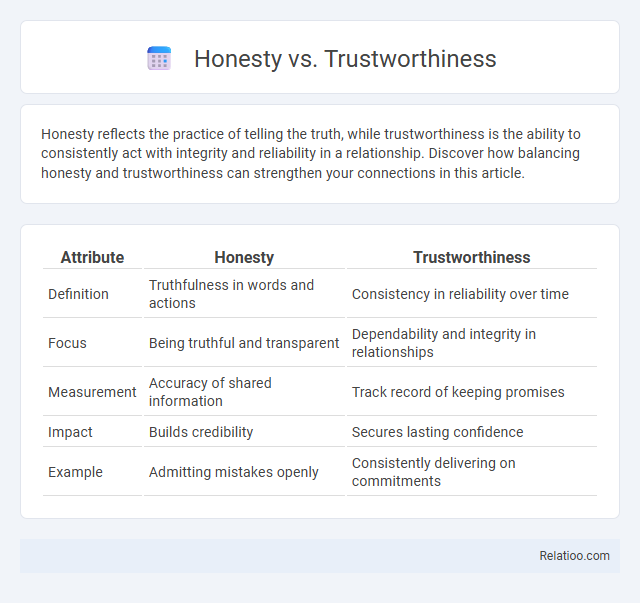Honesty reflects the practice of telling the truth, while trustworthiness is the ability to consistently act with integrity and reliability in a relationship. Discover how balancing honesty and trustworthiness can strengthen your connections in this article.
Table of Comparison
| Attribute | Honesty | Trustworthiness |
|---|---|---|
| Definition | Truthfulness in words and actions | Consistency in reliability over time |
| Focus | Being truthful and transparent | Dependability and integrity in relationships |
| Measurement | Accuracy of shared information | Track record of keeping promises |
| Impact | Builds credibility | Secures lasting confidence |
| Example | Admitting mistakes openly | Consistently delivering on commitments |
Defining Honesty and Trustworthiness
Honesty involves consistently telling the truth and being transparent in actions and communication. Trustworthiness extends beyond honesty by encompassing reliability, integrity, and the ability to be depended upon in various situations. Clear differentiation helps in understanding that honesty is the foundation of trustworthiness, but the latter requires sustained ethical behavior and accountability.
Key Differences Between Honesty and Trustworthiness
Honesty involves being truthful and transparent in your words and actions, while trustworthiness reflects the reliability and consistency that make others confident in your character over time. Your honesty is the foundation for building trustworthiness, but trustworthiness encompasses a broader commitment to keep promises and safeguard confidences. Understanding these key differences helps you develop deeper, more reliable relationships through both truthful communication and dependable behavior.
The Role of Honesty in Building Relationships
Honesty serves as the foundation for building strong relationships by fostering transparency and authenticity in communication. Trustworthiness emerges when consistent honesty is demonstrated, reinforcing reliability and emotional security between individuals. This alignment between honesty and trustworthiness enhances mutual respect and deepens interpersonal connections.
How Trustworthiness Influences Social Bonds
Trustworthiness is a critical factor in strengthening social bonds because it establishes reliability and consistency in your actions, fostering a sense of security among individuals. Unlike honesty, which centers on truthfulness, trustworthiness encompasses dependability and integrity, making others more likely to confide in and collaborate with you. This deep trust enhances cooperation and emotional connections, ultimately reinforcing lasting relationships.
Honesty Without Trustworthiness: Is It Possible?
Honesty without trustworthiness creates a paradox where truthful words lack reliability or integrity, undermining meaningful relationships and credibility. Trustworthiness encompasses consistency, dependability, and ethical behavior, which honesty alone cannot guarantee if actions repeatedly contradict spoken truths. In essence, honesty without trustworthiness may still communicate facts accurately but fails to inspire confidence and long-term respect.
Trustworthiness Without Complete Honesty
Trustworthiness hinges on consistently reliable behavior and keeping promises, even when complete honesty isn't disclosed. Your ability to be trusted often relies more on actions that demonstrate loyalty and dependability rather than revealing every detail transparently. Balancing discretion with sincerity shapes how others perceive your trustworthiness in personal and professional relationships.
Real-World Examples of Honesty vs Trustworthiness
Honesty involves truthfulness and transparency in your actions and communication, while trustworthiness is the ability to consistently demonstrate reliability and integrity over time. For example, a person who admits a mistake immediately exemplifies honesty, but someone who consistently meets deadlines and keeps promises shows trustworthiness. Your reputation in personal and professional relationships depends not only on being honest but also on maintaining trustworthiness through consistent behavior.
Cultivating Honesty and Trustworthiness in Daily Life
Cultivating honesty and trustworthiness in daily life involves consistently practicing transparency, keeping promises, and communicating sincerely to build strong interpersonal relationships. Demonstrating accountability for actions and showing empathy enhances trustworthiness while fostering a reputation of honesty. Embedding these values into routine behavior encourages mutual respect and creates a foundation for lasting trust in personal and professional environments.
The Impact of Culture on Honesty and Trustworthiness
Culture profoundly shapes perceptions of honesty and trustworthiness, influencing how truthfulness and reliability are expressed and interpreted in different societies. In collectivist cultures, trustworthiness often emphasizes loyalty and group harmony over blunt honesty, while individualistic cultures may prioritize candidness as a core aspect of honesty. Understanding these cultural nuances is crucial for effective communication and relationship-building across diverse cultural contexts.
Striking the Balance: Developing Both Qualities
Developing honesty and trustworthiness requires you to consistently communicate truthfully while demonstrating reliability through actions that align with your words. Striking the balance between these qualities enhances your personal and professional relationships by fostering genuine connections and credibility. Emphasizing both honesty in expression and trustworthiness in behavior creates a foundation for lasting respect and confidence.

Infographic: Honesty vs Trustworthiness
 relatioo.com
relatioo.com